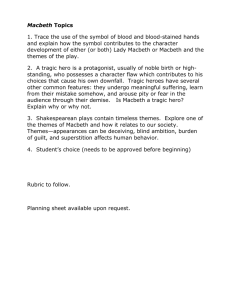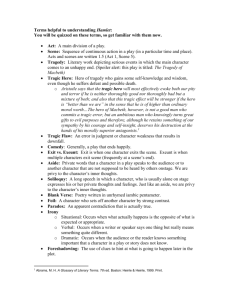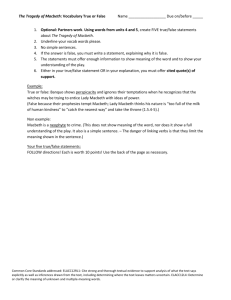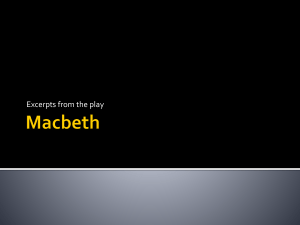Macbeth: Act 1 Scene 1
advertisement
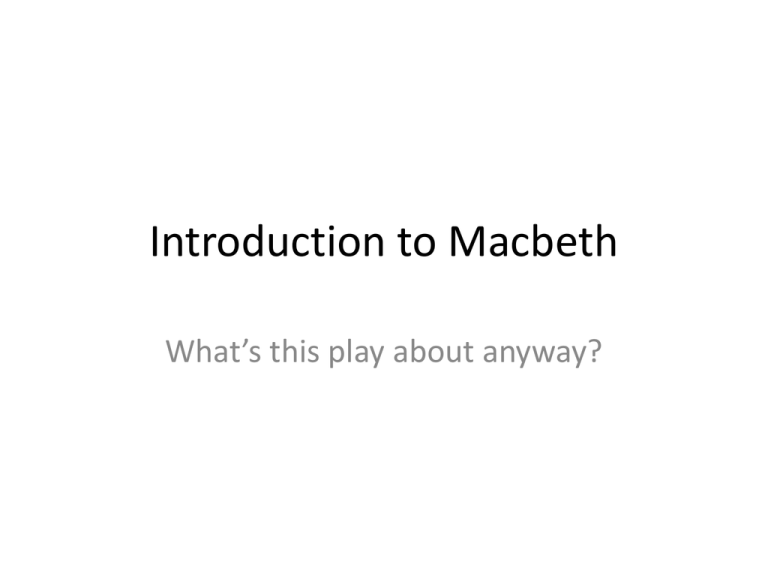
Introduction to Macbeth What’s this play about anyway? Plot Overview • Shakespeare’s shortest and bloodiest tragedy, Macbeth tells the story of a brave Scottish general (Macbeth) who receives a prophecy from a trio of sinister witches that one day he will become King of Scotland. • When the play begins, there are two wars in progress: 1. Civil War - King Duncan vs. Macdonwald’s rebels 2. National War - Scotland, led by King Duncan, against invading Norway, led by King Sweno Elements of Drama • Stage Directions (lighting, blocking, etc.) • Irony (verbal, situational and dramatic) – Dramatic Irony: There is a contradiction between what the character thinks and what the reader or audience knows to be true • Subtext • Dialogue (dialogue, monologue, soliloquy, asides) – Monologue: a long speech delivered by one character to another, or to a group – Soliloquy: Character’s internal thoughts, spoken aloud in a Shakespearean play – Aside: A private remark to one character or to the audience that breaks the conventions because it is understood not to be heard by other characters on stage. Shakespearian Tragedy • Tragedy: This is an event or work of fiction that results in a disastrous conclusion for the main character. – This character is known as the tragic hero. • In a tragedy, the hero is destroyed by his/her own mistakes. – This mistake is known as a tragic flaw Shakespearian Tragedy: Basic Set Up 1. Act 1: The Exposition (introduction) - the beginning of the story that gives background information on characters and previous action. Here the reader learns about the general setting, the persons, the character traits, problems of the play, the major conflict, and the tragic hero’s flaw. 2. Act Two: Rising Action- Beginning of the action that will lead to a high point in the story 3. Act Three: Climax-the turning point of the story; the part of the story in which the protagonist reaches an emotional high point or a peak in power 4. Act Four: Falling Action-the action that occurs after the climax, before everything is wrapped up in the story 5. Act Five: Catastrophe and Resolution - when the events of the falling action bring the protagonist to his fate and order is restored. Important Topics and Motifs to Look Out For • • • • • • • • Ambition Fate and Free Will Violence Manhood and The Nature of Man Nature and the Natural World Light and Darkness Blood Fair and Foul Mood in Macbeth: Act 1 Scene 1 • https://www.youtube.com/watch?v=clG8ha2 D26g Character in Macbeth: Act 1 Scene 3 • 1. This is the first time that we see Macbeth in this play, though we have heard about him. Analyze his character based only on this scene; be sure to support your explanation. • 2. Compare Macbeth and Banquo in this scene. How do they react similarly and differently to the predictions the witches make? What does this say about their characters? • Soliloquy: Character’s internal thoughts, spoken aloud in a Shakespearean play • Because it is what the character is thinking, and only the audience can “hear” these thoughts, soliloquies often reveal A LOT of information about the characters. Personal Response Imagine for a moment that you’ve just done THE WORST thing you could ever imagine YOURSELF doing. (NOTE: this is subjective—for one person it may be breaking curfew, for another if may be murder (though I sincerely hope not!!)) On your piece of paper, explain this act. Then, ponder the following: To what lengths would you go to cover up this horrible act? Or… Would you confess immediately? Explain. What role does fear play in your decision making?
